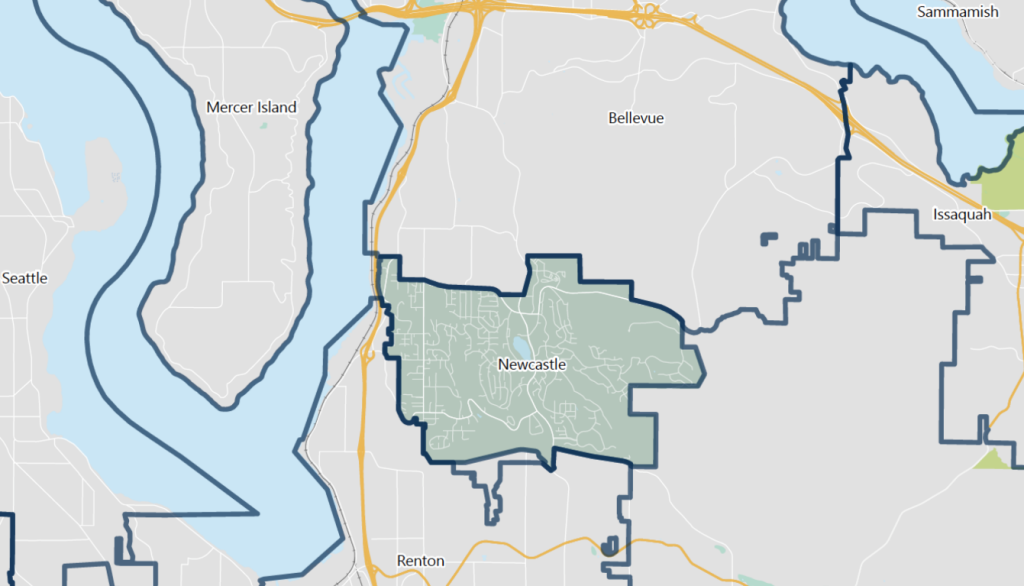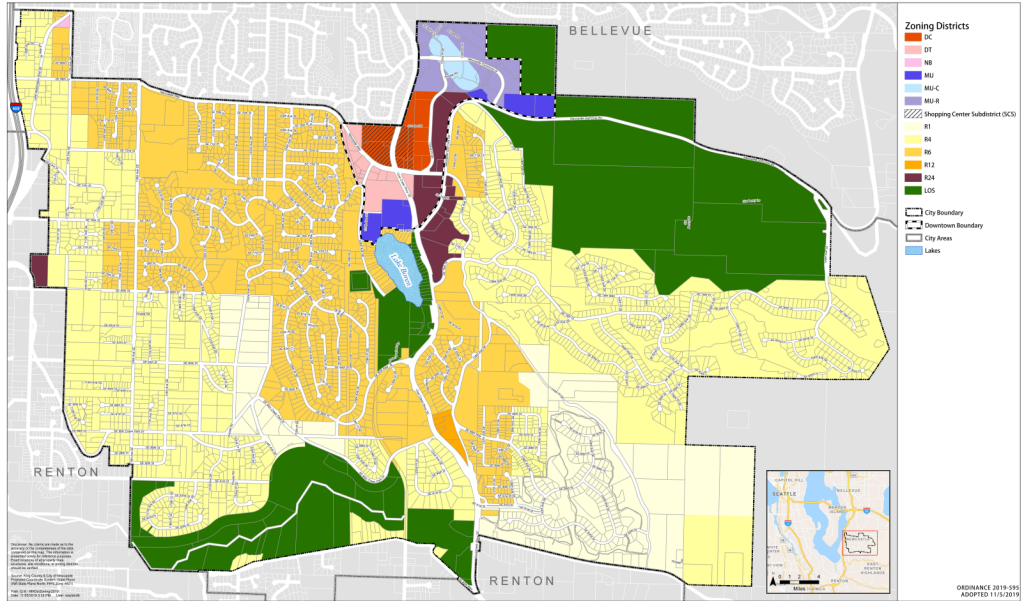
Last month, the Newcastle City Council voted to reverse a long list of changes that had been made to the city’s Comprehensive Plan, at the recommendation of the city’s planning commission. A majority of the edits had been geared around dropping concepts that are seen as progressive priorities, including the acknowledgement of climate change, an emphasis on equity and considering impacts on marginalized communities, and references to past discriminatory practices around land use.
The 4-3 vote saw Robert Clark, Newcastle’s Mayor, in the minority. Clark had vocally pressed the planning commission to make many of the changes earlier this year, submitting a long list of suggestions, many of which were adopted verbatim.
Among the changes the council majority restored were edits that had modified “climate change” to more amorphous “environmental” impacts and deleted numerous references to policies focused on providing city services more equitably. The mayor-backed version scrapped an entire policy that recommended the adoption of Equitable Development Zones, Barrier Reduction Programs, and Community Investment Funds in the city. Also on the chopping block was a policy encouraging the city to consider utilizing city-owned land for affordable housing.
In the end, Deputy Mayor Pratima Lakhotia along with Councilmembers Sun Burford, Ariana Sherlock and Paul Charbonneau voted to reinstate language matching the version of the Comprehensive Plan that had been advanced early this year before it could be modified by the planning commission.

“There are certain core values that Newcastle was built on, and I believe we cannot shy away from that. We need to continue to maintain that,” Deputy Mayor Lakhotia said ahead of the vote, after numerous public commenters asked the council to restore the plan’s equity language. “And I think a lot of people have already voiced it today, and I would support what the general people want and maintain our values and principles of Newcastle.”
Newcastle has become an unlikely partisan battleground since Clark’s election to the role of Mayor in January 2024. Like neighboring Bellevue, Newcastle’s city council selects the city’s mayor from amongst its ranks — while the city manager (an appointed position) holds much of the executive power. Clark, however, has sought to wield his mayoral powers aggressively.
A debate about whether the city should fly the Pride flag in June — a commonplace occurrence at dozens of city halls around the region — garnered regional and national attention following an initial council vote against flying the flag. The move that was later reversed after one councilmember flipped their vote.
With the Comprehensive Plan debate, the city’s more substantive policies were dragged into that fully partisan debate, with numerous public commenters at council meetings referencing President Donald Trump’s executive order targeting diversity, equity, and inclusion (DEI) practices as an impetus to change the plan.
Much of Newcastle’s discussion around the Comprehensive Plan was focused around a new state requirement that local cities are required to document the history of exclusionary practices within their borders: policies like restrictive covenants and redlining. After an investigation into past racially restrictive covenants, the conclusion of Newcastle city staff wasn’t that they never existed, but that they have mostly been scrubbed from the record.
“To date, Newcastle staff have been unable to find examples of deeds with racial restrictions or evidence of redlining in Newcastle, largely because those restrictions are illegal and have been removed from title reports,” the final version of the plan states. “That said, there were properties in Newcastle subdivided by CD Hillman in the early 20th century. CD Hillman’s other developments in nearby Renton have been found to have restrictive covenants and were developed around the same time.”
“I believe that if you start talking about DEA [sic], then you’re going to start having some problems with racism,” Councilmember Tom Griffin said. “Because you’re going to make it known that, we might have a problem here, let’s talk about it. Some people say, ‘well just because you don’t see it, [that doesn’t mean] it isn’t there’ — well show it to me, I’d like to see it!”
This episode also raised eyebrows in Newcastle due to the fact that Clark pushed the city’s planning commission so explicitly for the changes he wanted to see. At the commission’s public hearing on the Comp Plan plan in January, Clark provided comment in person and warned the body that if they didn’t act to remove certain language, then it would be pulled out by the full council.
“There are a whole bunch of things in this plan that say things like, ‘implement inclusive engagement processes, implement programs and policies that acknowledge and empower the contribution of…’, what does that mean?,” Clark said. “So please, get rid of all this stuff. I know this is going to come to the council, I’m also a resident but I’m also the Mayor, right? And I’m not going to tell you how I’m going to vote, that would be unethical, but you can probably get the idea from my comments.”
Ahead of the final vote, Clark tried to frame the changes recommended by the planning commission as removing ambiguity, making the bizarre argument that developers wishing to build homes in Newcastle would be confused by the Comprehensive Plan. Requirements for new construction aren’t found in a Comprehensive Plan, which is a more high-level vision statement intended to guide future decision making, but rather in the city’s land use code. Clark also suggested that councilmembers should also support whichever side of the issue had submitted the most comments.
“I cannot support this motion, at all, and I’m disappointed, frankly that we’re going to be putting this ambiguity in there,” Clark said. “We revived a lot of comments, emails, and so on. There was more comments, emails and signatures in favor of keeping [the planning commission recommendation] than there were to take it out, so I would encourage my colleagues to vote with the majority.”
Lurking behind this back-and-forth scrum over policy language is the fact that Newcastle’s Comprehensive Plan takes very few actual steps to make the city more affordable or accessible to underserved communities. The city’s future land use map only calls for denser housing to be allowed in a small area, within the downtown district, despite planning policies adopted by King County that call for local jurisdictions to prioritize access to affordable housing in throughout their borders.

Last December, the King County Affordable Housing Committee (AHC) called this fact out in a letter to Newcastle, noting that while the plan outlines potential policies to increase housing affordability, including make it easier to build accessory dwelling units (ADU) and middle housing — all changes required by recent state laws — it stops short of legalizing the types of housing most likely to be affordable for households earning a modest income in King County: apartment buildings.
Newcastle is required to accommodate nearly 1,500 new units of housing through 2044 under the county’s adopted growth targets, and the plan assumes that the lion’s share of that new development will be built in the downtown zones, with very little new housing allowed elsewhere.
“[T]he draft plan does not set reasonable expectations that these strategies alone will provide affordable housing throughout the jurisdiction […] or promote fair housing policies and practices so that every person in the county has equitable access and opportunity to thrive in their communities of choice,” the AHC’s letter noted.
A similar attempt to cordon off the higher-density zoning into one small section of the city is a major factor that led the pro-housing nonprofit Futurewise to appeal the nearby city of Mercer Island’s Comprehensive Plan to the state’s Growth Management Hearings Board. The outcome of that appeal still unresolved.
Ultimately, the plan adopted by the council represents a victory for the council’s progressive majority, retaining language that faced significant push back during a highly polarized national political moment. How impactful that gesture will end up being for a city that is already as highly exclusive as Newcastle, however, remains to be seen.
Ryan Packer has been writing for The Urbanist since 2015, and currently reports full-time as Contributing Editor. Their beats are transportation, land use, public space, traffic safety, and obscure community meetings. Packer has also reported for other regional outlets including Capitol Hill Seattle, BikePortland, Seattle Met, and PubliCola. They live in the Capitol Hill neighborhood of Seattle.


